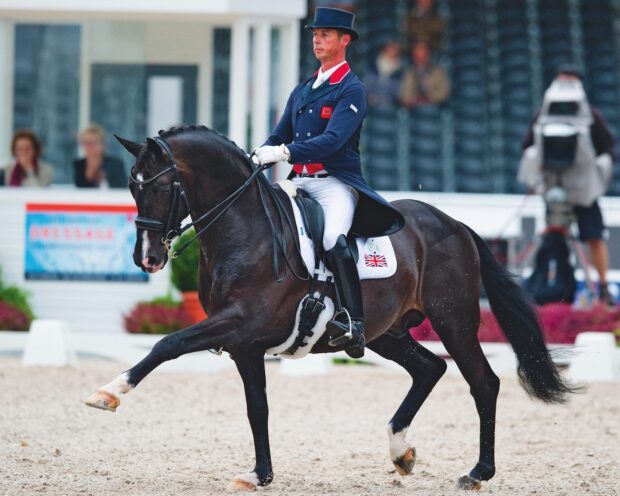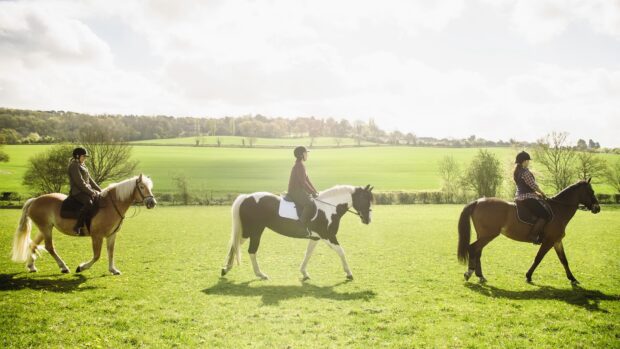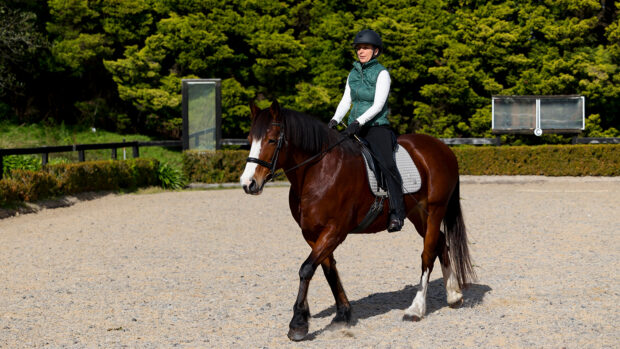Everyone makes mistakes in dressage tests. Yes, even Olympic medallists like Carl Hester and Charlotte Dujardin. Part of the art of good test-riding is being able to cope when things go wrong in the arena.
Maybe your horse can’t wait to get on with the job and refuses to stand still in halt, or perhaps he loses balance in canter so changes legs or breaks. Unfortunately there is no hard and fast rule when it comes to dealing with these situations and, hopefully, salvaging some marks along the way. Every horse is different, and every movement is different, too.
The most important thing to remember is that each movement is marked individually. A mistake in one movement doesn’t have to affect the next. Through practice, you can train yourself to stay in the moment, putting errors behind you and focusing on what’s coming up.
And remember, judges don’t hold grudges. They won’t mark the next movement down because the previous one went wrong – unless the problem persists.
“Judges don’t hold mistakes in their minds,” says top international judge Isobel Wessels. “A judge will give you a low mark for a reason, but then they move on. They won’t hold it against you.”
But Isobel also points out that the way in which a rider handles problems in a test can influence the marks given for the movements in question.
In the event of a horse who won’t halt at the start of a test, “you can’t just sit there and sort it out, and no judge would expect you to”, says Isobel, adding that once the horse has moved twice, pushing on with the rest of the test is often the best course of action, even if it means sacrificing the halt mark.
But in other situations, correcting the mistake will win you favour with the judges.
“If, for example, a prix st georges horse comes out of a half pirouette and makes a flying change [instead of continuing in counter canter], and the rider makes no attempt to correct that, that’s not good,” says Isobel.
“As a judge you wonder if they know what’s going on if they’re not trying to show the movement required. If you can bring the horse back and then execute the change properly, you’re showing you can be effective as a rider.”
“Always do the best for your horse”
So, when it comes to mistakes in dressage tests, when should you try to correct the movement, and when should you accept it’s happened and simply move on with the test?
Isobel says it comes down to the impact your actions will have on your horse. If correcting the error, for example continuing to try to make a tense or overexcited horse halt, will cause or exacerbate tension that will filter into the rest of the test, it’s usually best not to. In these situations, staying calm and riding positively forward into the next movement will impress the judges and benefit your horse, too.
On the other hand, if something’s gone wrong but your horse’s relaxation is unaffected, try to produce at least some of the movement required, to demonstrate your skill and influence as a rider.
“You have to stay completely calm and relaxed – and always do the best for your horse,” Isobel says. “If you try to correct too strongly you can end up with a horse that is more tense at the end. This is when it’s important to know your horse, but also to trust your feeling,”
You may also be interested in..

Top judge reveals how to boost your dressage scores – in ways you may never have considered

8 training gems from Carl Hester that could transform your dressage scores

Subscribe to Horse & Hound magazine today – and enjoy unlimited website access all year round
Horse & Hound magazine, out every Thursday, is packed with all the latest news and reports, as well as interviews, specials, nostalgia, vet and training advice. Find how you can enjoy the magazine delivered to your door every week, plus options to upgrade your subscription to access our online service that brings you breaking news and reports as well as other benefits.




